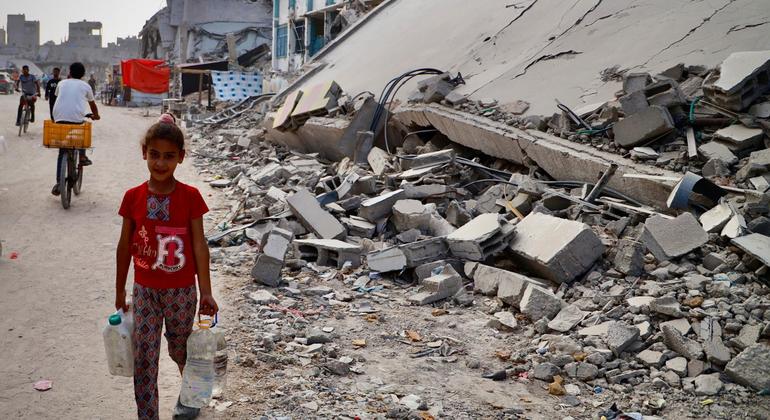The World Health Organization (WHO) Director-General Tedros Adhanom Ghebreyesus recently made a crucial announcement regarding the administration of vaccines to children in Gaza in the coming weeks. This decision comes in response to the looming threat of a potential polio outbreak in the region. Despite no recorded cases of polio so far, the dire situation in Gaza has raised concerns among humanitarians about the possibility of a devastating public health emergency.
The lack of access to healthcare services, exacerbated by the ongoing conflict in Gaza, has created an environment ripe for the spread of preventable diseases. Outbreaks of hepatitis A and other communicable diseases have already been reported, underscoring the urgent need for intervention. Dr. Ayadil Saparbekov, Team Lead for Health Emergencies at WHO in the Occupied Palestinian Territory, warned that the spread of polio and other communicable diseases could potentially result in more preventable deaths than those caused by war-related injuries.
The recent identification of vaccine-derived poliovirus type 2 in sewage samples from Khan Younis and Deir Al-Balah has further heightened concerns about the potential for a polio outbreak in Gaza. The virus can emerge in areas with poor vaccination coverage, where the weakened form of the orally administered vaccine virus strain can mutate into a more virulent form. This discovery has underscored the critical need for immediate action to prevent the spread of the disease.
Prior to the conflict, children in Gaza had access to robust routine vaccination services, with high rates of polio vaccine coverage. However, the recent decline in vaccination rates has left a significant portion of the population vulnerable to preventable diseases. Efforts to combat the circulating variant poliovirus type 2 in Gaza have been intensified, with the WHO convening health ministers from across the Eastern Mediterranean region to coordinate a response.
Dr. Hanan Balkhy, WHO Regional Director for the Eastern Mediterranean, highlighted the urgent need for action to contain the potential polio outbreak in Gaza. She emphasized the importance of swift and decisive measures to protect the children of Gaza from the devastating effects of the disease. The meeting of health ministers resulted in agreements to enhance surveillance efforts and conduct multiple mass polio immunization campaigns in collaboration with other essential health services.
In order to facilitate the vaccination roll-out in Gaza, representatives called for a safe and enabling environment, including a ceasefire or days of tranquillity to allow for the necessary steps to be taken. The collective efforts of the international community are crucial in preventing a public health crisis in Gaza and protecting the most vulnerable populations from the threat of polio.
The situation in Gaza serves as a stark reminder of the devastating impact of conflict on public health systems and the urgent need for coordinated action to prevent the spread of preventable diseases. The WHO’s efforts to address the potential polio outbreak in Gaza highlight the importance of prioritizing public health interventions in conflict-affected areas to protect the most vulnerable populations.









